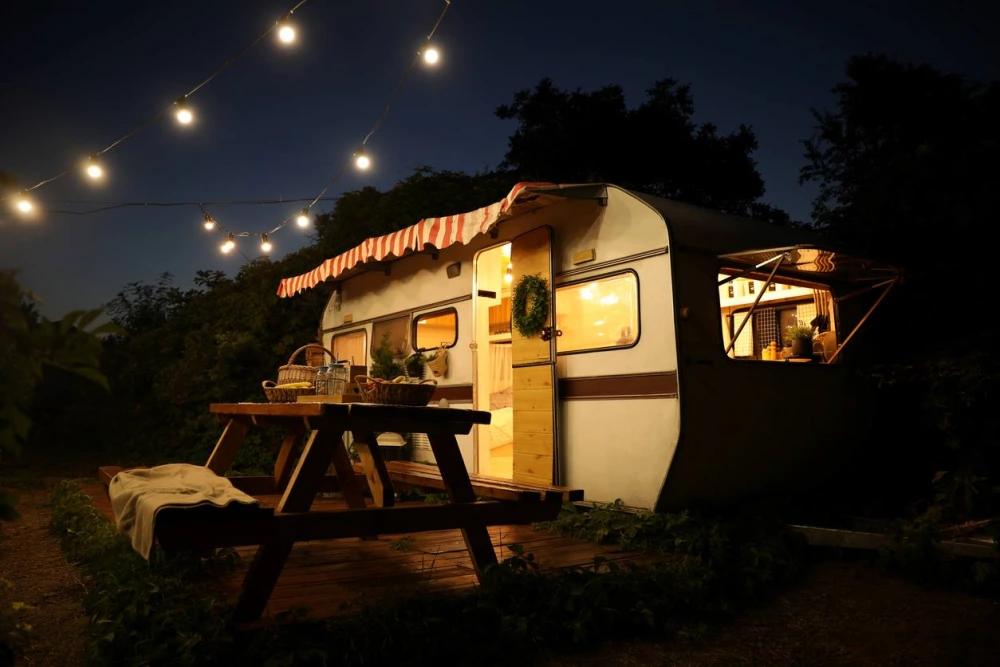The Pros and Cons of RV living

Are you exhausted from the monotony of living in one place day in and day out? Do you dream of traveling the country and experiencing new adventures? If so, understanding how to live in an RV could be the key to living your best life.
Embarking on the RV lifestyle can be a truly enriching experience. However, it’s essential to consider the significant pros and cons before hitting the road. To help get you started on this new journey, we’ve put together a comprehensive guide exploring all aspects of how to live out of an RV, whether you’re planning to go full-time or just part-time.
Within this guide, you’ll discover all the essential information required on how to live in an RV, from the best practices and tips to the potential drawbacks. So roll up your sleeves, grab a map, and let’s take a closer look at the pros and cons of RV living.
Pros of RV Living
Living in an RV can offer a range of benefits that are hard to come by in a traditional home. Highlighted below are some of the key benefits of RV living:
- Flexibility: Living in an RV means that you can change your scenery as often as you like. With no permanent home tying you down, you have the freedom to travel to new places and explore at your leisure.
- Cost-effective: RV living can be significantly cheaper than living in a traditional home. You won’t have to worry about paying rent or a mortgage, and your utility bills will be considerably lower. Plus, you can cook your own meals and save money on eating out.
- Minimalism: Living in an RV forces you to downsize and live with only the essentials. This can be a liberating experience, allowing you to de-clutter your life and focus on what really matters.
- Closer to nature: When you live in an RV, you’re often surrounded by beautiful landscapes and natural wonders. You can wake up to a stunning view and take advantage of outdoor activities like hiking, kayaking, and fishing.
- Community: RV living can be a great way to connect with like-minded individuals. There are many RV communities across the country where you can meet other travelers and share your experiences.

Cons of RV Living
While RV living has many advantages, it also has its fair share of drawbacks. Here are some of the most significant disadvantages of RV living:
- Limited space: Living in an RV means that you’ll have to downsize significantly, which can be challenging if you’re used to having a lot of possessions or living in a larger home.
- Maintenance: RVs require regular maintenance and upkeep, including cleaning, repairs, and general maintenance. This can be time-consuming and costly.
- Travel fatigue: Constantly moving from place to place can be tiring and stressful, especially if you’re doing it full-time. It can be challenging to establish a routine and find a sense of stability.
- Weather concerns: Living in an RV means that you’re exposed to the elements, which can be uncomfortable or dangerous in extreme weather conditions.
- Limited amenities: While RVs come equipped with most of the basic amenities you need, they may not have all the luxuries of a traditional home, such as a full-size kitchen or a washer and dryer.

How to Live Out of an RV
If approached correctly, living in an RV can prove to be an immensely gratifying experience, despite the potential setbacks. By planning ahead and taking the appropriate measures, you can effortlessly embark on a comfortable and safe journey.
To help you get started, here are a few tips on how to live out of an RV.
Do your research.
Before venturing out on your journey, ensure that you’ve thoroughly researched and planned your route. Learn about local laws and regulations in different states, as well as the rules and restrictions at different campgrounds.
To do this, you’ll need to find reliable sources of information. Look for online forums and blogs about RV living to get a better understanding of what it’s like and how to best prepare. A good place to start would be the RecNation blog, which covers all things related to the life of an RVer.
Set your budget.
Since RV living can be cost-effective, it’s important to set a budget and make sure that you’re sticking to it. Calculate expenses such as gas, campsite fees, and maintenance costs, and make sure you have enough money saved up for emergencies.
Consider investing in some of the best RV travel apps so you can find affordable campsites and discounts on activities. This simple step can aid in reducing your travel expenses.
Learn maintenance basics.
While it’s not necessary to become a master mechanic overnight, you should have some basic knowledge of how your RV works and the type of maintenance it requires. Keep an eye out for common issues like a leaky roof or a clogged toilet, and make sure to learn basic troubleshooting techniques.
Investing in a high-quality set of tools for repairs and maintenance can be a wise decision, as it can save you a significant amount of time, money, and undue stress in the long haul.
Make reservations before traveling.
When you’re living out of an RV, it’s important to make sure you have a place to stay before you hit the road. You can use online booking services like RecNation or Hipcamp to find campsites and RV parks with all the amenities you need.
If you have four-legged companions, make sure to check which parks allow pets and reserve your spot in advance. If they don’t have any availability, consider staying at pet-friendly hotels or motels. Just make sure they don’t charge extra for pets.
Invest in the right gear.
To ensure a comfortable and safe journey, make sure to invest in the right gear before hitting the road. This includes items like solar panels for electricity, a water filter for drinking water, and an RV cover for protection from the elements.
Food, clothing, and other items should also be taken into consideration. Stock up on nonperishable staples like canned goods and pre-made meals, as well as comfortable clothes that can withstand harsh weather.
Frequently Asked Questions about RV Living
How do you receive mail when living in an RV?
Many full-time RVers use mail forwarding services. These services provide a permanent address where your mail is sent, then forwarded to your location or scanned and emailed to you. You can also have mail sent to a friend or family member or use general delivery at a nearby post office.
How do you manage water, sewage, and electricity?
Most RV parks provide full hookups, meaning you’ll have access to fresh water, sewer connections, and electricity. If you’re boondocking (camping off-grid), you’ll rely on your fresh water tank, waste water tanks, and a power source such as solar panels or a generator.
What is boondocking, and how do you do it?
Boondocking refers to camping without hookups (no water, sewer, or electricity) in remote areas. RVers rely on solar power, batteries, propane, and their water tanks to live off-grid for days or even weeks.
How do you stay connected to the internet while traveling?
Many RVers use mobile hotspots, satellite internet, or Wi-Fi boosters to stay connected. It’s common to have a cellular data plan from a major carrier and use devices like hotspots or routers to create a reliable connection.
How much does RV living cost?
Costs vary depending on your lifestyle and how often you travel. Major expenses include the RV itself, maintenance, campground fees, fuel, insurance, and internet. Some RV parks can be expensive, while boondocking on public land is usually free. Full-time RVers typically spend anywhere from $1,500 to $3,500 per month.
How do you deal with RV maintenance and repairs?
Regular maintenance like oil changes, tire rotations, and checking fluid levels is crucial. You can either do this yourself or visit specialized RV service centers. Some full-timers join RV roadside assistance programs like Good Sam or AAA RV Plus in case of breakdowns.
Can you live in an RV during the winter?
Yes, but winter RV living can be challenging. You’ll need to insulate your RV, use space heaters or the built-in furnace, and ensure your water lines don’t freeze. Some RVers “snowbird,” traveling south during winter months to avoid extreme cold.
How do you downsize to live in an RV?
Downsizing involves selling or storing belongings that won’t fit in the RV. Minimalism is important for RV living. Many people sell furniture, large appliances, and extra clothes, keeping only essentials that will comfortably fit in the limited space.
What is the best type of RV for full-time living?
It depends on your needs and lifestyle. Class A motorhomes offer the most space and amenities, while travel trailers and fifth wheels can be more affordable and offer flexibility. Some prefer smaller Class C motorhomes or camper vans for easier travel and boondocking.
Find a place to store your RV.
It won’t do you any good to have a great RV if you don’t have anywhere to park it. If you’re not ready to hit the road just yet, find a safe and secure place to store your RV.
There are many options available for RV storage, depending on your needs and budget. If you are keeping your RV in one area for the long term, investigate storage options nearby.
RecNation provides a seamless large vehicle storage solution designed to safeguard your prized possession and make life a breeze between adventures.
Our storage features have been crafted with utmost attention to detail, leveraging years of industry expertise in the field of self-storage. This guarantees a dependable and top-notch customer experience that you can rely on.
Wrapping Up
We trust that these tips have been valuable as you progress towards your RV living goals! While the transition may seem intimidating at first, with careful planning and a positive outlook, the possibilities for exploration and adventure with an RV are endless.
As you gear up for your adventure, why not leave your RV in safe hands? Whether you’re planning to hit the road full-time or just for occasional trips, finding a reliable storage facility is crucial to protect your RV from theft, damage, and the elements.
Find your nearest RecNation facility today and experience the peace of mind that comes with exceptional RV storage.
